|
|
|
Sort Order |
|
|
|
Items / Page
|
|
|
|
|
|
|
| Srl | Item |
| 1 |
ID:
157853
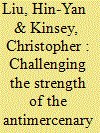

|
|
|
|
|
| Summary/Abstract |
This article questions the prevailing view that there is a strong international norm against mercenary activity. We argue, instead, that international restrictions placed upon mercenaries are the tangential expressions of more basic and pervasive international norms, namely those of state neutrality, the right of peoples to self-determination, and freedom of movement. To buttress our claim, we draw upon documentary evidence specific to critical moments in the norms’ expansion, including the Napoleonic Wars to 1840, the Crimean War, and conflicts of national liberation in the decolonization era. The evidence suggests a broad indifference to mercenaries among policymakers during such pivotal periods. We conclude that the antimercenary norm grounded in moral objections is not as strong as its supporters suggest and often becomes compromised when national interests dictate.
|
|
|
|
|
|
|
|
|
|
|
|
|
|
|
|
| 2 |
ID:
140006
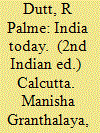

|
|
|
|
|
| Edition |
2nd Indian ed.
|
| Publication |
Calcutta, Manisha Granthalaya, 1970.
|
| Description |
xxii, 662p.hbk
|
|
|
|
|
|
|
|
|
|
|
|
Copies: C:1/I:0,R:0,Q:0
Circulation
| Accession# | Call# | Current Location | Status | Policy | Location |
| 005056 | 954.0359/DUT 005056 | Main | On Shelf | General | |
|
|
|
|
| 3 |
ID:
123060
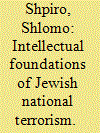

|
|
|
|
|
| Publication |
2013.
|
| Summary/Abstract |
The Lehi, a fringe Jewish paramilitary group created in 1940, conducted a concerted terrorist campaign against the British authorities in Palestine during and after World War II, proclaiming that its activities were undertaken in the name of national liberation. Lehi was founded and led by Avraham Stern, also known as "Yair." Scholar, intellectual, and poet, Stern developed a fundamental ideology of national and messianic Jewish terrorism, which became the ideological basis not only for the work of the Lehi, but also for later Jewish terrorist activism. The present article examines the intellectual foundations of Lehi terrorism and how its intellectual and ideological principles influenced Lehi's most controversial activities-internal terrorism and the execution of its own members. In conclusion, the author traces the impact of Stern's intellectual legacy on later generations of Jewish terrorists.
|
|
|
|
|
|
|
|
|
|
|
|
|
|
|
|
| 4 |
ID:
124921
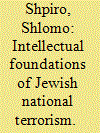

|
|
|
|
|
| Publication |
2013.
|
| Summary/Abstract |
The Lehi, a fringe Jewish paramilitary group created in 1940, conducted a concerted terrorist campaign against the British authorities in Palestine during and after World War II, proclaiming that its activities were undertaken in the name of national liberation. Lehi was founded and led by Avraham Stern, also known as "Yair." Scholar, intellectual, and poet, Stern developed a fundamental ideology of national and messianic Jewish terrorism, which became the ideological basis not only for the work of the Lehi, but also for later Jewish terrorist activism. The present article examines the intellectual foundations of Lehi terrorism and how its intellectual and ideological principles influenced Lehi's most controversial activities-internal terrorism and the execution of its own members. In conclusion, the author traces the impact of Stern's intellectual legacy on later generations of Jewish terrorists.
|
|
|
|
|
|
|
|
|
|
|
|
|
|
|
|
| 5 |
ID:
192294


|
|
|
|
|
| Summary/Abstract |
This article engages with Patrick Wolfe’s theoretical underpinnings and programmatic consequences of his settler-colonial theory. It contextualizes the renaissance of the settler-colonial paradigm, scrutinizing its theoretical innovations. In doing so, the article traces Wolfe’s work back to its origin in the work of Marcel Mauss and his notion of total social facts, discussing this theory’s political orientation around anti-racism and liberal subjectivity. It then shows how Wolfe applies his theory to Palestine, erasing class divisions and imperialism, militating against the theory and practice of national liberation. In conclusion it reflects on the use and limits of this theory for supporting anti-systemic struggle.
|
|
|
|
|
|
|
|
|
|
|
|
|
|
|
|
| 6 |
ID:
046576


|
|
|
|
|
| Publication |
London, Routledge, 2001.
|
| Description |
ix, 268p.
|
| Standard Number |
0415239338
|
|
|
|
|
|
|
|
|
|
|
|
Copies: C:1/I:0,R:0,Q:0
Circulation
| Accession# | Call# | Current Location | Status | Policy | Location |
| 045055 | 355.0218/BEC 045055 | Main | On Shelf | General | |
|
|
|
|
| 7 |
ID:
167656


|
|
|
|
|
| Summary/Abstract |
This article re-examines Third Worldism as a political ideology, with a specific focus on a number of Algerian intellectuals. By taking Algeria as a privileged locus of investigation, the discussion zooms into a specific context of Third Worldism, the Algerian War and the decade after, therefore focusing on the period between the 1950s and the 1970s. Here I understand Third Worldism to mean more than the instantiation of the postcolonial state through anticolonial liberation struggles. Rather, I take into consideration (Algerian) voices that push against the rigid boundaries of methodological nationalism and postcolonial theory. By embracing the ethos of ‘affirmative critique,’ the analysis aims to bring to light those ‘forgotten, hidden or invisible acts of critique’ that expose under-currents of Third Worldism not usually discussed or engaged. Thus, I engage writings of rarely considered Third World intellectuals, such as Kateb Yacine, Jean Amrouche, Jean Senac. These are all Algerian intellectuals; the reason behind this focus is the following: their involvement in Algeria’s decolonization struggles translated into translocal solidarity with other decolonization projects, whether in Vietnam or in Palestine. Aside from gesturing toward a translocal spatiality, their writings also embody a more genuine retrieval of dignity by the colonized, and an alternative memory of a different Algerian nation, intrinsically plural and hospitable to difference. Put differently, these voices both attempt a kind of diagnosis (however partial and incomplete) for the reductionism into which the Third World liberation state (inevitably) fell, while suggesting an alternative political horizon that comes closer to Fanon’s idea of ‘national consciousness’, especially in its attention to the ‘international dimension.’1
|
|
|
|
|
|
|
|
|
|
|
|
|
|
|
|
| 8 |
ID:
128997
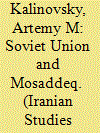

|
|
|
|
|
| Publication |
2014.
|
| Summary/Abstract |
Although it is generally accepted that the Soviet Union did not play a significant role in the events leading to the overthrow of Mohammed Mosaddeq in 1953, little has been written about how the Soviets perceived the Iranian leader and the movement he inspired. This article argues that Soviet leaders generally saw Mosaddeq as weak and ill-disposed towards the Soviet Union. The Soviet failure to secure an oil concession in Iran in 1946 and general conservatism about anti-colonial movements during the late Stalin period conditioned their assessment of Mosaddeq's premiership. After Soviet policy towards the Third World changed in the mid-1950s, Mosaddeq's movement was reinterpreted as a genuine "struggle of national liberation."
|
|
|
|
|
|
|
|
|
|
|
|
|
|
|
|
| 9 |
ID:
080865
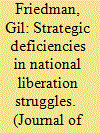

|
|
|
|
|
| Publication |
2008.
|
| Summary/Abstract |
This study reports and explains a cluster of deviations from the basic rational criteria of national liberation strategy exhibited by 'inside' West Bank Fatah leaders during the al-Aqsa uprising, based on an analysis of public statements of three such leaders. The leaders fail to recognize that their attempt to deter Israeli offensives by threatening to reciprocate them with attacks inside the Green Line is sabotaged by Islamists independently attacking inside the Green Line; inadequately attend to the distinct possibility that attacks within the Green Line increase Israeli opposition to desired concessions on refugees and territory; and appear to occasionally get swept-up in the sentiment that reciprocating Israeli aggression is inherently just. The study elaborates and examines the possible roles in these strategic deficiencies of leader strategic desperation; rage and indignation; and the political need to satisfy widespread popular militancy. The study's logic complements existing asymmetric conflict research and can inform research beyond the Palestinian-Israeli case.
|
|
|
|
|
|
|
|
|
|
|
|
|
|
|
|
|
|
|
|
|